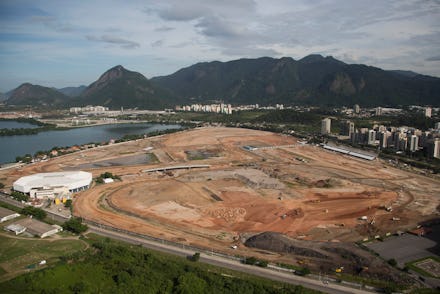9 Photos From Brazil That Everyone Needs to See Ahead of the World Cup

Brazil's Olympic Games are again making headlines, and for reasons that feel a little bit like #SochiProblems.
International Olympic Committee Vice President John Coates said the preparations for the 2016 games are "the worst" he's ever seen. According to Coates, the country's much-touted infrastructure projects were delayed and construction hasn't even started on some venues. He stated that the IOC had arranged a special task force to address the issue, adding, "The situation is critical on the ground."
Many Brazilians would agree with Coates that their situation is indeed dire, but for reasons that don't seem to concern the IOC.
Infrastructure projects meant to prepare the city for the upcoming games have displaced more than 3,000 families, according to human rights groups, many thanks to forcible evictions. Under the evictions, people are moved from neighborhoods where they are close to friends, work, school and basic amenities, to barren complexes disconnected from their previous lives.
The government maintains that these evictions have been made to improve the lives of both Brazilians and tourists. Bus lines and roads are slated to cut through some of the old housing areas, making transportation around Rio easier.
In additional preparation for both the 2016 Olympics and this the 2014 World Cup, the Brazilian government moved "police pacification units" into Rio's Mare favela last month to address a surge of crime in the area. Residents have died during the most recent drug raids and in clashes with police. Most recently, one person was killed during a protest in which residents blamed police for the death of a young man from the neighborhood.
The pacification program has been in place since 2008, shortly before Brazil's bid to host the Olympic games was accepted. It was initially meant to raise the standard of living, curb drug-related violence and ease concerns of international visitors to the games. The closest Coates came to acknowledging the heavy hand of the Brazilian government in his statement was his comment that Brazil had "social issues that need to be addressed."
It's clear that both sporting events have come at a steep cost for Rio residents. Here are photos that show just how much the 2014 and 2016 events have disrupted daily life for many Brazilians:
1. A woman gets pepper-sprayed during a protest in one of Rio's favelas.
A woman is pepper-sprayed during a demonstration over the death of Douglas Rafael da Silva Pereira, a well-known resident of the Pavao-Pavaozhinho favela.
2. Families are forced out of their homes to make way for Olympics preparations.
A resident walks over the rubble of a demolished home in the Vila Recreio II favela. Families were forced out of their homes in this slum, razed three years ago to make way for an Olympics expressway.
3. Police Pacification Units police the favelas.
Officers of the Police Pacification Unit patrol next to a burning barricade during clashes at the Pavao-Pavaozinho favela, which erupted after the death of da Silva.
4. Preparations for sporting events have increased the security presence.
Army soldiers walk during an operation in the Mare favela while residents play soccer.
5. Construction of Rio's Olympic Park has been delayed.
More than 2,000 construction workers building Rio's Olympic Park have been on strike since April 3. Strike leaders say that the company overseeing construction is "overloading workers."
6. Rio's Guanabara Bay remains heavily polluted.
The government's promise to clean up the bay have yet to be fulfilled. Brazil pledged to treat 80% its sewage, but currently only 30% is treated, leaving the rest to flow into waterways.
7. "Eco-boats" have been collecting garbage in Guanabara Bay.
The government is using so-called "eco-boats" in order to clear the bay's polluted waters, where the 2016 Olympics' sailing and wind surfing events will take place.
8. Brazilians take to the streets to protest rising costs.
Protesters take a stand against rising transportation costs in Rio de Janiero. Last June, 1 million protesters took to the streets against the upcoming World Cup to protest the rising cost of living.
9. Favelas demand basic sanitation.
Despite big money investments into roads ahead of the games, Rio's favelas still don't have basic sanitation.